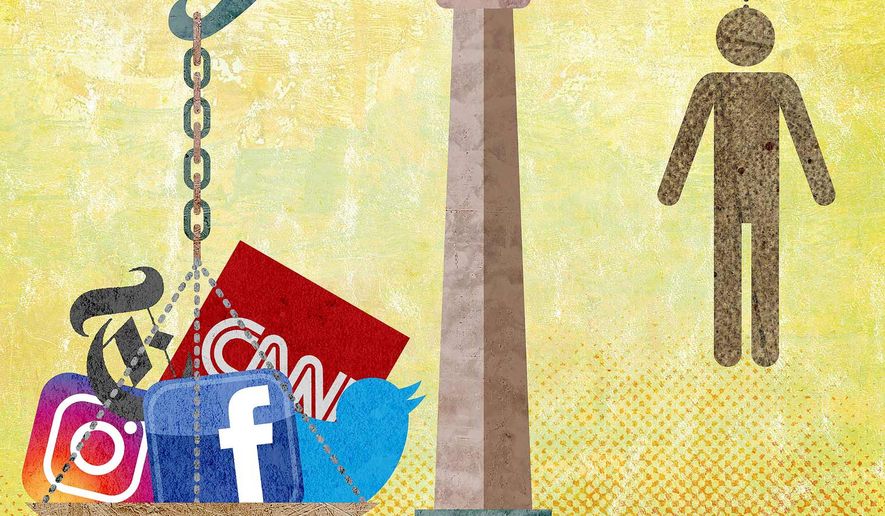OPINION:
Our constitutional crises in America are many and garner great debate. There’s the explosion of executive power in the federal government, the abandonment of states’ rights, the erosion of religious liberties and assaults on Second Amendment rights, among others.
Perhaps no other, however, is more ignored than how our ravenous digital society is diminishing the rights of the accused.
We seldom have the foresight to think about how new technologies could be abused to the detriment of constitutional freedoms. The Kyle Rittenhouse trial is the latest example of the kind of “trial by media” that cuts against fair administration of justice. In our digital society, those concerns should not stop at the courtroom doors.
States should act now to end or severely limit the practice of television cameras in the courtroom. The Bill of Rights is primarily dedicated to the rights of the accused. How our communications and technology impact those rights must be considered and deserves action to protect further injustice.
Trials were never intended to be made-for-TV events or Twitter bonanzas. They are not entertainment. Real lives hang in the balance.
The Sixth Amendment to the Constitution, extended to the states by the 14th Amendment, provides for an individual’s right to a public trial of one’s peers. Certain state Constitutions go beyond that definition to include, as in the case of Virginia, the right to an “impartial jury of his/her vicinage.”
Thomas Jefferson believed that the public trial by jury was “… the best of all safeguards for the person, the property, and the fame of every individual.” The Founders saw a jury of those from their locality as the fairest way to protect them and their “fame” or reputation.
They could never have imagined that an accused individual would be subject to constant video surveillance, 24-hour commentary and gratuitous vilification on a national or even global scale.
The addition of rabid cable news, toxic social media, and ubiquitous mobile technology has only eroded the system further. The innocent, like Mr. Rittenhouse, pay a heavy price. They are defamed at will by millions of armchair analysts, prognosticators and provocateurs, few if any who have the full record of evidence before them.
It leaves the accused’s reputation to the whims of the mob, not carefully guarded by those peers in their local community, as was once envisioned.
Trials were once viewed in person and by a very limited number of folks interested enough and fortunate enough to grab a seat on a wooden bench in a cramped local courthouse. The media was permitted to report on the day’s events without being intrusive to the process. MSNBC’s behavior during the case alone is good reason to reassess our current voyeuristic fascination with these cases.
Thanks to trial by media and an outdated Supreme Court “Times malice” precedent regarding libel and slander, today’s innocent defendants can be acquitted only to find their reputation outside the courtroom destroyed to the point they live like a criminal for life. They are free but in a prison of society’s making for them.
If a defendant is found guilty and goes on to pay his debt to society, should he not be entitled to a second chance in our system?
Not only have the risks to a defendant’s reputation been ignored by the government for too long, but in an era when violent activist groups like Black Lives Matter and Antifa are allowed to operate with impunity, the need to shield the accused is even greater.
People today are not interested in understanding a proceeding as much as commenting on it or using it to fuel their own agendas.
The Supreme Court’s old standard in Estes v. Texas should form the rationale for legislation that limits courtroom cameras and other live reporting from court proceedings: “[a] defendant on trial for a specific crime is entitled to his day in court, not in a stadium, or a city or nationwide arena. …”
Justice Earl Warren’s concurrence, in that case, is equally relevant today, stating, “televising a trial … diverts the trial from its proper purpose in that it has an inevitable impact on all the trial participants; … detracting from the dignity of court proceedings and lessening the reliability of trials.”
Perhaps it’s enough not to show the faces of defendants and witnesses as we do now with juries. Making live audio recordings available could be a middle ground. Without video, visual mediums may dedicate less time to sensationalizing these cases. There are good arguments for maintaining some broader access, but it’s time to reign in this insanity.
• Tom Basile is the host of “America Right Now” and “Wake Up America Weekend” on Newsmax Television, author and former Bush administration official.




Please read our comment policy before commenting.